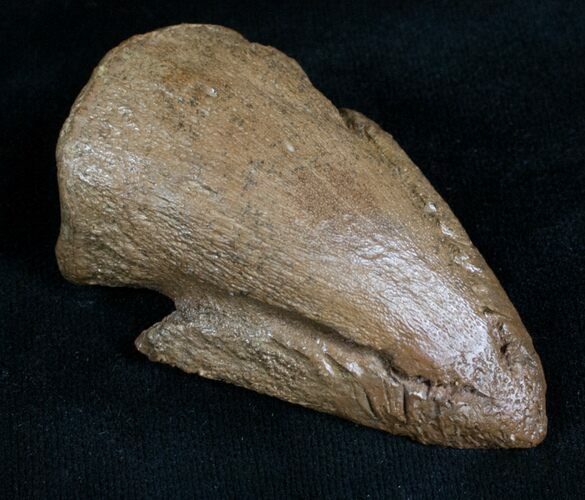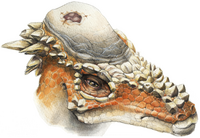This Specimen has been sold.
Awesome Pachycephalosaurus Claw - South Dakota
This
is a foot claw of the dinosaur Pachycephalosaurus ("thick headed lizard"). The claw is 2.32" long and beautifully preserved. Pachycephalosaurus bones and claws are rare finds, as most of what is found is teeth and skull fragments. There is some restoration to the very tip of the claw.
This claw comes from a private dig in the Hell Creek Formation of South Dakota. The Hell Creek Formation represents a sub-tropical floodplain which would have been similar to coastal, modern-day Louisiana. This area was home to some of the most recognizable dinosaurs in the world including triceratops, hadrosaurs and the king of them all, T-Rex.
Pachycephalosaurus was a bipedal dinosaur that lived during the Late Cretaceous period and probably was about 15 feet in length.
Pachycephalosaurus had a distinctive, large, bony, dome on top of it's skull up to 10 inches thick to cushion it's brain from impacts.
Some paleontologists believe this thick skull may have been used for head-butting, much like rams while others contend it may have been a sexual display.
It was one of the last non-avian dinosaurs before the K-T extinction event, 65 million years ago.
There is only one known species of Pachycephalosaurus, Pachycephalosaurus wyomingensis. It's remains have been found in Montana, South Dakota and Wyoming.
It was either a herbivore or an omnivore with small leaf shaped teeth which would have been very effective at shredding plants.
This claw comes from a private dig in the Hell Creek Formation of South Dakota. The Hell Creek Formation represents a sub-tropical floodplain which would have been similar to coastal, modern-day Louisiana. This area was home to some of the most recognizable dinosaurs in the world including triceratops, hadrosaurs and the king of them all, T-Rex.
SPECIES
Pachycephalosaurus wyomingensis
LOCATION
Butte County, South Dakota
FORMATION
Hell Creek Formation
SIZE
2.32" long
CATEGORY
SUB CATEGORY
ITEM
#7532
We guarantee the authenticity of all of our specimens.
 Reviews
Reviews

















